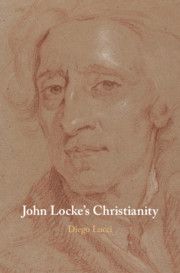Book contents
- John Locke’s Christianity
- John Locke’s Christianity
- Copyright page
- Contents
- Acknowledgments
- Introduction
- 1 The Context and Background of Locke’s Biblical Theology
- 2 Engaging with Scripture and Heterodoxy
- 3 A Scripture-Based Moralist Soteriology
- 4 The Soul and the Last Judgment
- 5 The Trinity and Christ
- 6 Religious Toleration and Christian Irenicism
- Conclusion
- Bibliography
- Index
Introduction
Published online by Cambridge University Press: 24 September 2020
- John Locke’s Christianity
- John Locke’s Christianity
- Copyright page
- Contents
- Acknowledgments
- Introduction
- 1 The Context and Background of Locke’s Biblical Theology
- 2 Engaging with Scripture and Heterodoxy
- 3 A Scripture-Based Moralist Soteriology
- 4 The Soul and the Last Judgment
- 5 The Trinity and Christ
- 6 Religious Toleration and Christian Irenicism
- Conclusion
- Bibliography
- Index
Summary
Whereas John Locke (1632–1704) is best known for his "way of ideas" and political theory, he was also a skilled theologian. His theological concerns, interests, and ideas permeate his philosophical, political, and moral thought. Locke’s oeuvre in its different areas is indeed the production of a Christian philosopher. But Locke’s religious views are significant for yet another reason, in that his theological reflections resulted in a unique version of Christianity. Although Locke expounded his religious views in an unsystematic manner, given also his dislike of systems of doctrine and his hostility to claims of religious orthodoxy, an original and internally coherent form of Protestant Christianity emerges from his public as well as private writings. Locke's version of Christianity denotes various similarities with heterodox theological currents such as Socinianism and Arminianism, which Locke knew well. Nonetheless, Locke adhered to the Protestant doctrine of "sola Scriptura," according to which the Scriptures contain all that is needed for salvation. Thus, he always made sure that his conclusions were consistent with, and indeed grounded in, Scripture.
- Type
- Chapter
- Information
- John Locke's Christianity , pp. 1 - 14Publisher: Cambridge University PressPrint publication year: 2020

